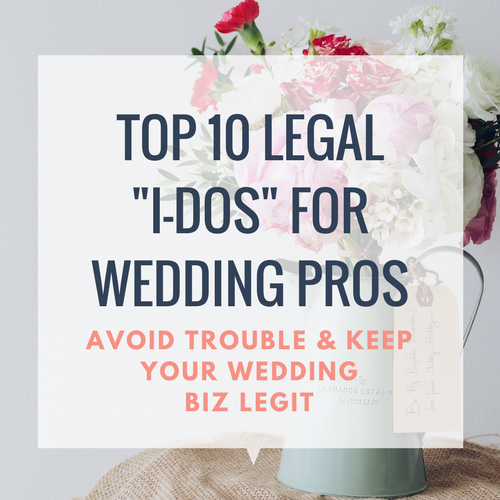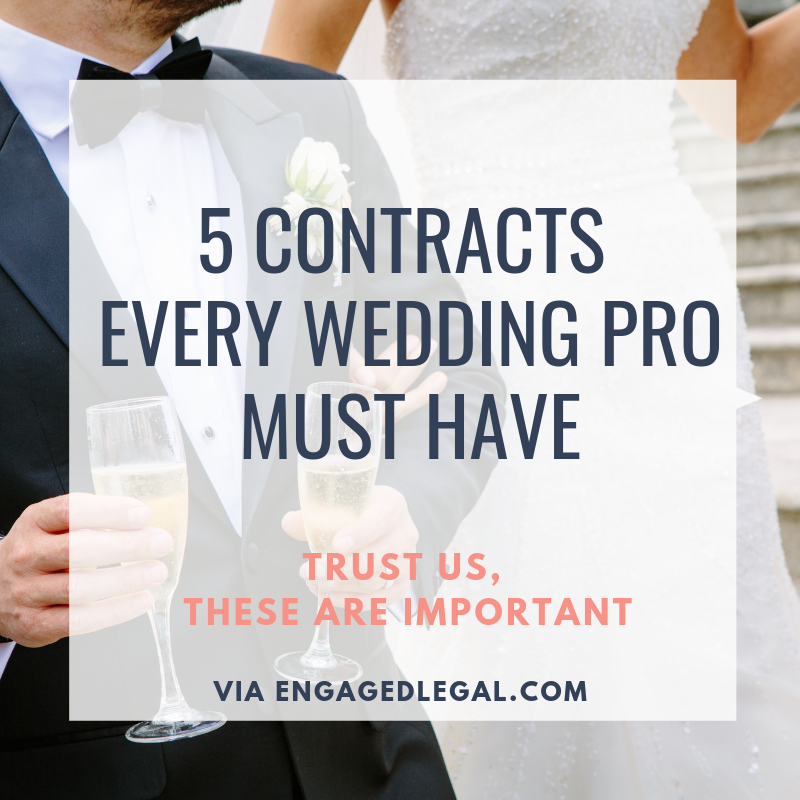Five Contracts Every Wedding Pro MUST Have
/**Updated 5/10/2019**
You're a creative business owner. Stop for a second and realize how AWESOME that is. You're DOING IT!
Now take a second to realize that your business, while amazing and special and unique, has to play by certain rules.
And that you must ensure your business-- and all the hard work that goes along with it-- is protected.
The best way to do this? Through tight, niche-focused contracts. These contracts, drafted by lawyers who know the ins- and outs- of the industry, will do three very important things:
1. Define expectations
2. Set out payment terms, (or, in the instance there is no payment, the sets out the "exchange" of goods or services) and
3. Plan for the worst.
These are the three basic things any contract is going to do. Granted, contracts are much more complex than this. But keeping these three goals in mind will help you understand why I feel the following are the TOP 5 CONTRACTS EVERY WEDDING PRO NEEDS:
1. Service Contract. This is the contract between you and your client. This is probably what you think of when I say the word "contract." It's going to be your most important piece of paper. Make sure they are extremely detailed and contain as many specific terms (who, what, when, where, why, how, how many) as possible.
If you regularly service different types of clients, you may even need different service contracts. For example, if you're a commercial photographer who does wedding photography on the side; if you're a graphic designer who designs wedding invitations, or if you are a planner specializing in corporate events as well as wedding planning. Those are different clients with different needs!
2. General copyright license/ assignment. Did you know that just because you pay someone to draw/ create/ design/ take a photo of something doesn't mean you own it?
Did I blow your mind?
The copyright vests in the author of the photo/ logo/ design/ image/ song/ writing. So unless YOU made it yourself, with your own two hands, you're not the owner! And to use it, you need a copyright assignment.
There is an exception here for a "Work Made For Hire." This occurs when there is an employer/ employee relationship (read: NOT an independent contractor!) and the creative "thing" was made within the scope of the employee's work. As an example, a logo created by an in-house designer at a company would belong to the company. A logo created by someone hired on a project basis-- like an outside small agency, or an independent contractor-- wouldn't be a work made for hire (unless specific exceptions apply). The answer? Get a copyright license or a copyright assignment (copyright transfer).
You'll use this one over... and over... and over... and over....
3. Termination Agreement. Sometimes, things just don't work out. It could be because you and the couple don't jive, or it could be because someone needed to reschedule. Either way, you are going to need a document outlining where money goes, what gets refunded, and who is responsible for what. (We’ve got one for wedding planners and venues. Photogs, you’re next.)
4. Styled Shoot Agreement. Who is going to do what? What happens if someone gets hurt? What happens if someone backs out last minute? Who can submit photos, to what publications? And what type of credit needs to appear when the photos are used?
Oh, and remember: because the copyright vests in the author, the photographer owns any images coming out of the shoot. For this reason, I build my copyright licenses into Styled Shoot Agreements (as an addendum).
5. Website/ Email list Terms of Service. I probably caught you off guard with this one. After all, it isn't your traditional "contract." I used to be a bit lax with folks when they asked about ToS for their websites-- it wasn't something that every site needed. NOW, however, with the advent of email-list-building-maina, you've GOT to have one.
Why?
Part of the reason has to do with the CAN-SPAM Act and the newer GDPR. Another important piece is that if you're collecting PII-- Personally Identifiable Information-- you need to disclose how it is being used. Are you working with affiliates? Do you combine an email list from one of your businesses with another? You must tell people. And while this isn't your traditional "contract," where both parties sign, the user's agreement to continue using your site/ enter their email is agreement enough.
Now go on and build that email list!
What do you think? Do you have any contracts that have saved your butt? Do you think we missed anything?
Leave your comment below!



















